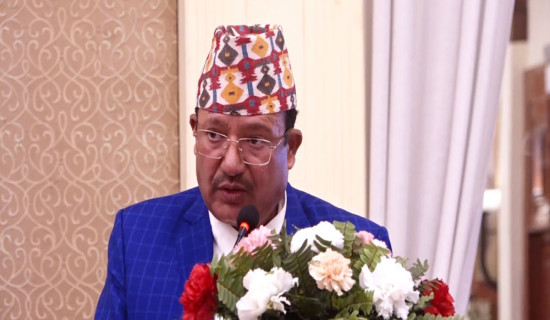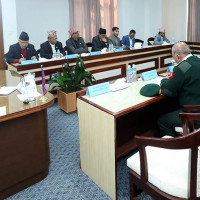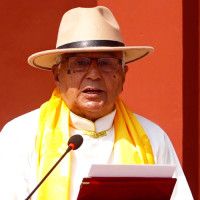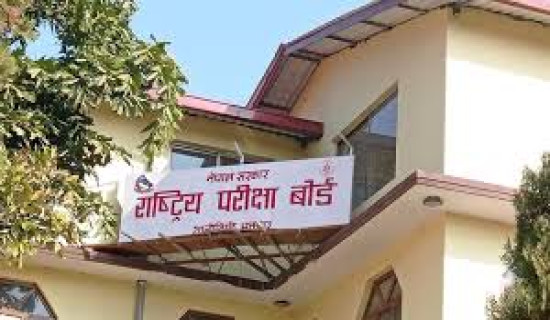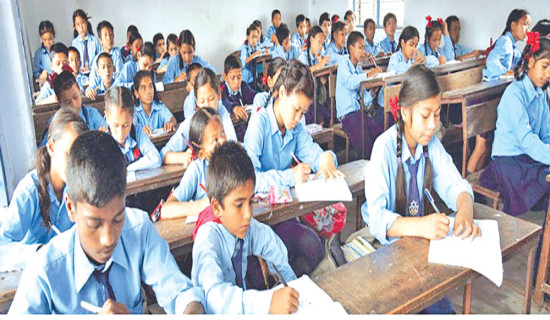- Wednesday, 18 February 2026
Years on, Nepal grapples with post-CPA challenges
Kathmandu, Nov. 26: Nepal is currently following the course set by the 17-year-old Comprehensive Peace Accord (CPA), a fundamental agreement that restored peace by ending the 10-year armed conflict and facilitated the integration of the then armed force Communist Party of Nepal (Maoist) into mainstream politics.
As per the agreement with the party, the nation has been operating under a republican system for the past 15 years ushered in by new constitution, which has ended many disparities prevalent in society on the basis of class, caste, gender, religion, region and others. Along with the republic system in Nepal, citizens are able to choose the leader of nation with their votes. Now, Pushpa Kamal Dahal ‘Prachanda,’ the former commander of the armed group, is leading the nation as executive chief.
However, amid all this, there is a growing sentiment of scepticism towards the republican system. Some people have begun to question its efficacy, advocating instead for a return to royal anarchism. On last Thursday, Durga Prasai, a medical entrepreneur, organised a political rally in Kathmandu against the existing system.
The emergence of this situation can be attributed to the actions of political leaders. While the parties within the democratic system have been successful in institutionalising changes at a systemic level, they are unable to address the tangible concerns and status of the people. This perceived gap has provided an opportunity for figures like Prasai and other royal acolytes to capitalise on the growing frustration among the masses. The discontent among the people has become a fertile ground for alternative ideologies, and leaders advocating for a return to royal regime have found resonance in this environment, people who had contributed to establish the republican system are commenting like this.
Incomplete work of CPA
On November 21, 2005, the then Prime Minister Girija Prasad Koirala and Maoist Chair Pushpa Kamal Dahal ‘Prachanda’ came together to sign the historic agreement, officially declaring the termination of the armed conflict. This significant event led to the cease-fire declared on November 8 after an agreement between seven political parties and the Maoists.
The CPA sought to end the conflict between the government and the Maoists. It comprised a ceasefire including the management of arms and armies of both the national army and the Maoist group by the United Nations.
It called for political, economic and social change in the country and adherence to humanitarian law and human rights principles, including through the establishment of a Truth and Reconciliation Commission and a National Peace and Rehabilitation Commission.
The agreement called for the election of a constituent assembly to end the transition period and calls on the UN to observe and assist the electoral process. The agreement also called for the nationalisation of all property belonging to the King and Queen and to decide by a simple majority in the first Constituent Assembly meeting whether to retain the monarchy as an institution.
After signing the CPA, Prachanda commented that the signing of the peace agreement marked the greater realisation of people’s efforts to build Nepal anew. “This is a victory of those Nepalis who wish Nepal’s progress and a defeat of those favouring the status quo, preventing efforts to progress. The big powers and those arrogant nations are wondered by this success of the Nepali people.”
Establishment of peace, along with provisions for relief, rehabilitation and repatriation of the conflict survivors by normalising the situation through the formation of a specific commission was a crucial aspect of the accord. Around 17,000 citizens were killed during the decade-long armed conflict.
Though it was agreed to make public the personal details of those who were disappeared by both the government and rebel sides and make such details available to the respective families within 60 days of the signing of the CPA, the issue still remains unresolved.
Although the Truth and Reconciliation Commission (TRC) and the Commission of Inquiry on Enforced Disappeared Persons (CIEDP) were formed to deal with the cases of transitional justice, top positions of both commissions remain vacant. However, the government has tabled a Bill to activate the commissions.
During its term, the truth commission has received 63,792 complaints since its formation in February 2015. In the last seven years, the commission has recommended reparation and relief in 523 cases. Of this, only 29 families have received reparation and relief worth Rs 2.5 million. The commission hasn’t recommended prosecution in a single complaint so far.
The performance of the disappearance commission is not up to the mark either. The commission has received 3,223 complaints of enforced disappearances at the hands of state security forces and the Maoists. After a preliminary investigation, the commission has identified 2,484 cases as genuine although the International Committee of the Red Cross says 1,333 people are still missing in connection with the armed conflict.
The conflict-affected families and others not directly involved in the conflict are still languishing in pain.
“Even though the peace accord declared that the right of the conflict-affected, torture victims and the families of those disappeared persons to get relief would be guaranteed, it has not become a reality,” Bhagiram Chaudhary, a conflict victim leader said.
The then rebel side Maoists have led the government three times and participated in coalition governments eight times in the last 18 years.
In a conversation with The Rising Nepal, the Minister for Information Communication and Technology, Rekha Sharma, emphasised that despite significant advancements in various sectors, there are attempts to discredit the achievements of the ‘People’s War’ and the republican system. She attributed this to the parties’ inability to fully address the unresolved issues of the peace process. Sharma highlighted that the current Maoist-led government is earnestly working to resolve these lingering problems. However, she noted that certain groups persisted in creating obstacles, hindering the conclusive resolution of the peace process.
Failure to address livelihood
Despite the aspirations of the CPA to bring about economic and social transformation in the nation, the reality reflects a lack of tangible change for common people. Thousands of youths are forced to migrate abroad daily in search of better career opportunities. Graduates find it challenging to secure employment within the country. Widespread corruption prevails, impacting various facets of society. The elderly, in many cases, are left to live alone at home, and a pervasive sense of frustration permeates among people who struggle to achieve economic growth.
According to a news report published in this daily on November 22, CPN-Maoist’s former army commander Ramesh BK (Diamond) of Mangala Rural Municpality-4 in Myagdi district has been recruited into the Russian army. He had played a significant role as a company commander during the 10-year conflict led by the Maoist party.
BK, by posting on his Facebook account, stated that he took responsibility in Vladimir Putin’s army to participate in the war against Ukraine.
Like BK, many former Maoist combatants who carried guns for the change of nation’s face are now compelled to leave the country for their livelihood. Many wounded in war are still compelled to live with bullets in their bodies in lack of proper treatment. The irony is stark: those who were once committed to changing the socio-economic status of the people now find themselves grappling with personal hardships.
Khil Bahadur Bhandari, a journalist who was also involved in insurgency, has warned that if leaders do not rectify their behaviour and remain indifferent to bringing substantial improvements to the lives of common people, figures like Durga Prasai could pose a significant threat.
Bhandari further emphasised that the republic is not inherently weak and should not be weakened by royal followers.
Indicators are good in republican system
Analyst Manahari Timilsina said, “Anarchists believe that during the monarchy, it was a Ram Rajya (an ideal, prosperous rule), where there was no poverty, inequality, or discrimination, and they argue that it was a form of advanced democracy, which is ludicrous.”
However, the latest generations, unfamiliar with monarchy, may not fully realise that the current constitution is people-friendly. Leaders are engaged in multinational agreements more favourably for the nation compared to previous leaders. The leaders from that era were not gender-friendly and were involved in monopolising huge amount of properties, Timilsina said
Former Secretary Rameshwore Khanal highlights significant progress in road, communication, and electricity sectors under the republican system. Presently, there is a prioritisation of education and health.
There’s also an increase in freedom of speech, enhanced women representation, strengthened social security, and social awareness brought about by the republican system, according to Khanal.
However, for the victims, justice is more important than these things to heal their wounds. Therefore, political leaders need to be more serious to overcome the challenges stemming from the incomplete implementation of the Comprehensive Peace Accord (CPA) before it is too late so that conflict all victims like Bhagiram Chaudhary could realise justice as envisaged by the CPA.



